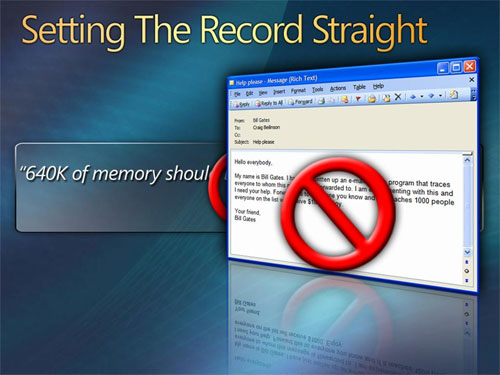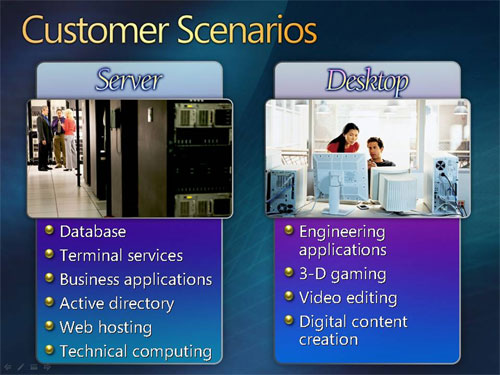WinHEC 2005 - Keynote and Day 1
by Derek Wilson & Jarred Walton on April 26, 2005 4:00 AM EST- Posted in
- Trade Shows
How much memory is "enough"?
Bill Gates is often misquoted as having said something to the effect that "no one will ever need more than 640K of memory!" Happy to poke some fun at himself, Gates suggested that anyone that actually believed this legendary quote probably also thinks that Microsoft is working on an email tracking system.
While the actual specifics of what was said may be lost to time and fading memories, the basic idea is that at some point, even unimaginable amounts of memory are likely to be exhausted. With the availability of 64-bit computing - and obviously XP-64 is not first to the party, although we'll leave discussions of Linux and other 64-bit OS solutions out for now - we now have the potential to address up to 2^64 bytes of memory (or 16 EiB of memory if you prefer). Gates quipped, "I'll be very careful not to say that 2 to the 64th will be enough memory for anyone. I will say that it might last us for a little while; it's quite a bit of memory, but some day somebody will write code that wants to go even beyond that."
In reality, our current x86-64 systems can't actually address that much memory - and with the largest readily available DIMMs currently coming in at 2 GB in size, it would require over two billion such DIMMs to provide 2^64 bytes of memory! For the present, hardware is limited to 40-bit or 48-bit physical address spaces, depending on implementation, which would still require hundreds or even thousands of 2 GB DIMMs to reach. As the hardware limits are approached, things can be modified to stretch the physical address space until it eventually reach 64-bits. When will this occur? Given that it took nearly two decades to go exceed the constraints of the 32-bit address space, 64-bits could very well last for several decades (at least on the desktop). But that's just speculation for now.

One of the areas that we really need to talk about is who specifically needs more than 32-bit memory spaces. While everyone stands to benefit in some ways from additional memory, the truth is that we will not all benefit equally. Servers and high-end workstations have already been available in 64-bit designs for a while, and they remain the primary examples of usage models that require more memory. You can see some examples of the server uses for 64 bit outlined above. A further example given was the MSN Instant Messenger servers. MS was able to reduce the number of servers - and thus the space required - while improving performance by shifting to a 64-bit environment.
On the desktop front, the vast majority of people aren't waiting with bated breath for Word 64 and Excel 64; instead, it's the content creation people that are working with large 3D models, movies and images that are beginning to run into the memory wall. 3D gaming may hit that wall next, although it may still be a couple more years. After conversations with several vendors following the keynote, we feel safe in stating that a major need for 64-bit Windows will only come if you're already running at least 2 GB of RAM. If you're not running that much memory, it doesn't necessarily mean you should avoid upgrading to XP-64, but you'll certainly get diminishing returns. On the other hand, if you're running 4 GB of RAM in your system and still running into memory limitations, 64-bit Windows has the potential to bring vast performance improvements.










36 Comments
View All Comments
PrinceGaz - Tuesday, April 26, 2005 - link
from page 3 "...and with the largest readily available DIMMs currently coming in at 2 GB in size"in reply to #5, #6 - Crucial have had 4GB PC2100 DIMMs available for purchase from their website for quite some time. They're certainly not cheap, but they are readily available. If you've got the cash I'm sure they'll sell you a few dozen of them.
DerekWilson - Tuesday, April 26, 2005 - link
MS may have needed to restrict 64bit to long longs due to some internal operating system code issues ... If, in fact, linux distros that run on x86-64 impliment 64bit longs this may be the case. Otherwise I'd lean towards a hardware issue.At this point I haven't looked into it, but I will be sure to ask around (as this is surely the place to do it).
bobsmith1492 - Tuesday, April 26, 2005 - link
Melgross - is that English?? I read it over real quickly and it was like... dude, what's he talking about? It just took a good close look though. :Pmelgross - Tuesday, April 26, 2005 - link
MS wants to control whatever they can. Control graphics memory and we are another step towards commoditized graphics boards.I wonder why MS went the way they did with the 64 bitness of the system. They went to (LL)P64 where just the long longs and the pointers are 64 bit, rather than LP64, where the longs are also 64 bit.
They are the only ones to do that. It seems like a half measure. A conversion from any Unix distro (or OS X) would need more work than is good, as well as a lessening in it's effectiveness as a 64 bit system. Are the 64 bit extentions of the x86 chips at fault?
JarredWalton - Tuesday, April 26, 2005 - link
Okay, the typos are fixed, and those that didn't like the 8-bit PNG graphics should now be happy. Iit was 4:30 AM when we finished, so our judgement was a bit impaired.) Just don't complain about how the PNGs are now five times as large. :)My personal opinion is that Windows XP removed most of the problems with the Windows platform. We'll see how Longhorn works out when it gets here, but that's still almost two years off. The graphics effects are nice, but pretty much totally unnecessary. Hopefully, we'll see some true improvements in the overall performance and not just eye candy.
Googer - Tuesday, April 26, 2005 - link
Linux on a MAC: Total freedom from with in a confined space.DerekWilson - Tuesday, April 26, 2005 - link
tbh, with the current state of things Linux game performance is not up to par with windows. Even with windows managing graphics memory, windows performance will likely be better.And from a workstation perspective, having virtualized graphics memory for free is more of a blessing than a curse.
I do think it would be better if MS gave graphics developers a choice whether to allow windows to manage graphics memory or not...
Son of a N00b - Tuesday, April 26, 2005 - link
dont you dare go screwing up the performance of my vid card ms...if you do im going linux...suryad - Tuesday, April 26, 2005 - link
Agreed. Windows should not be managing graphics ram...unless MS came up with some new techniques...MS seems to be pulling out all the stops though in my opinion. I think the hybrid drive is a good idea but like #12 said...that is quite a concern!Cygni - Tuesday, April 26, 2005 - link
#10's post makes me giggle.